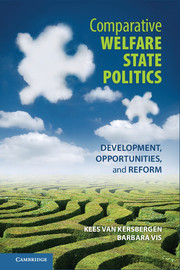Book contents
- Frontmatter
- Contents
- List of Tables and Figures
- Preface and Acknowledgments
- 1 Introduction
- 2 The Welfare State
- 3 The Logics of the Welfare State
- 4 Welfare State Regimes
- 5 What Do Welfare States Actually Do?
- 6 Toward an Open Functional Approach to Welfare State Reform
- 7 Why Do We Need to Reform the Welfare State?
- 8 Why Do We Need to Reform the Welfare State?
- 9 Why and How Do Politicians and Governments Pursue Risky Reforms?
- 10 Can and Will the Welfare State Survive the Great Recession?
- References
- Index
6 - Toward an Open Functional Approach to Welfare State Reform
Published online by Cambridge University Press: 05 June 2014
- Frontmatter
- Contents
- List of Tables and Figures
- Preface and Acknowledgments
- 1 Introduction
- 2 The Welfare State
- 3 The Logics of the Welfare State
- 4 Welfare State Regimes
- 5 What Do Welfare States Actually Do?
- 6 Toward an Open Functional Approach to Welfare State Reform
- 7 Why Do We Need to Reform the Welfare State?
- 8 Why Do We Need to Reform the Welfare State?
- 9 Why and How Do Politicians and Governments Pursue Risky Reforms?
- 10 Can and Will the Welfare State Survive the Great Recession?
- References
- Index
Summary
Introduction
In Chapter 5, we mapped and documented the persistent but also variable performance of welfare states. We developed the counterfactual argument that because welfare states have been performing their tasks remarkably well, there must have been a large amount of reform to adjust the existing architecture to the changing social and economic context of welfare politics. Surely, some policy drift – the conscious decision not to update existing social policy arrangements to respond to changing circumstances – must have occurred everywhere. However, the empirical documentation of how well welfare states worked shows that, with the exception of inequality, policy drift seems actually to be limited. Rather than suggesting that stability and the absence of change have been the main features of the past decades until the onset of the financial crisis, this observation implies that welfare states have shown the capacity to update social policies and to adapt to permanently changing circumstances. Since there must have been plenty of welfare state adaptation, updating, retrenchment, and restructuring – that is, reform – this has helped to secure the welfare states’ ability to perform their tasks. But, as we will document extensively in Chapters 7 and 8, functional stress has been building up steadily. Hence, we are expecting to see a great deal more reform pressure and policy adaptation, updating, retrenchment, and restructuring. Ultimately, the question is whether welfare states can continue to function, especially in the wake of the financial, economic, and debt crises since 2008 (see Chapter 10). In this chapter, we develop the theoretical tools for answering such questions. What is the best way to think about why and how welfare states should adjust to their continuously changing social and political context?
- Type
- Chapter
- Information
- Comparative Welfare State PoliticsDevelopment, Opportunities, and Reform, pp. 103 - 122Publisher: Cambridge University PressPrint publication year: 2013



